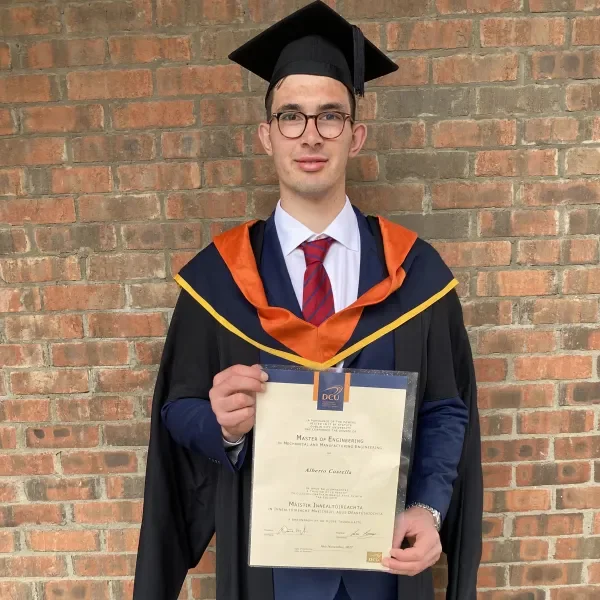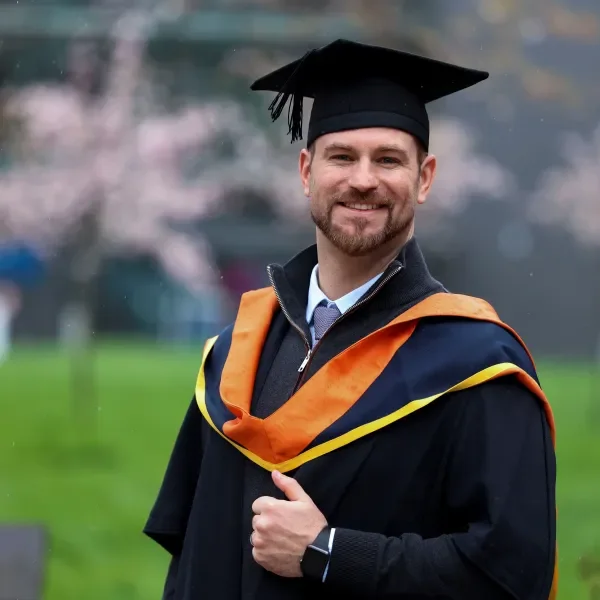Overview
Are you eager to investigate the potential of streamlining manufacturing or next-generation renewable energy systems? Do you want to make critical technologies and processes more efficient? This Master's degree allows students to specialise in the widely established area of Mechanical and Manufacturing Engineering and specialise in one of four areas: Simulation-driven Design, Advanced Manufacturing, Sustainable Systems and Energy, or Biomedical Engineering.
Simulation-driven Design
Simulation-driven Design is a crucial discipline for any engineer or designer looking to excel in their field. Simulations, in which computers predict the behaviour and performance of a design, have proven to be a powerful tool in various industries including automotive, aerospace, and manufacturing.
Simulations allow for the exploration of multiple design options and the assessment of performance under various operating conditions. This not only saves time and resources, it allows engineers to make informed decisions that lead to the development of efficient and reliable products.
Simulation-driven Design provides a unique opportunity to optimise designs and streamline the design process. By utilising simulation driven design, engineers can provide accurate and reliable results that were previously unattainable. The integration of high performance computer systems and global optimisation algorithms has taken Simulation-driven Design to a whole new level.
During this programme, youˇŻll explore the fundamentals of Simulation-driven Design and study topics including Advanced Finite Element Analysis, Turbomachinery, Computational Thermo-Fluid Dynamics, Manufacturing Systems Simulation, and more. At the end of the programme you will complete a project related to Simulation-driven Design in which you can showcase all of your newly acquired skills and knowledge.
Advanced Manufacturing
In todayˇŻs rapidly advancing technological landscape, the field of manufacturing is undergoing a powerful transformation.
The shift from traditional manufacturing to advanced digitised or even smart manufacturing can be seen as a paradigm shift, one that has the potential to ignite the next industrial revolution and reshape the global competitive landscape.
The emergence of smart manufacturing brings with it a host of opportunities for firms to reinvent themselves and push the boundaries of technological innovation.
During this programme, youˇŻll explore the world of Advanced manufacturing and undertake modules in Product Design, Surface Engineering and Tribology, Manufacturing Systems Simulation, Manufacturing Process Analysis, and much more.
At the end of the course you will complete a project related to Advanced Manufacturing in which you can showcase all of your newly acquired skills and knowledge.
Biomedical Engineering
In the field of medicine, the pursuit of innovative solutions in healthcare is paramount.
Advancements in biomedical engineering have the potential to revolutionise patient care and improve the quality of life for individuals around the world.
From developing cutting-edge medical devices to designing sophisticated imaging systems, biomedical engineers play a crucial role bridging the gap between technology and healthcare. They apply the principles of engineering and design to solve complex medical problems and create innovative solutions that save lives and improve patient outcomes.
By pursuing a masters in this area, you can position yourself at the forefront of this exciting and dynamic field.
During this programme, youˇŻll explore the world of Biomedical Engineering by undertaking modules like Biomechanics and Tissue Engineering, Design for Clinical Practice, Finite Element Analysis, and more.
At the end of the course you will complete a Biomedical Engineering project in which you can showcase all of your newly acquired skills and knowledge.
Sustainable Systems and Energy
As societies around the world continue to grapple with the implications of climate change, there is a growing expectation for engineers to play a crucial role in developing solutions that promote sustainable development.
Sustainable Engineering is a vital discipline that encompasses designing and operating systems in a way that promotes the responsible use of energy and resources. The field focuses on utilising engineering principles and innovative technologies to create an efficient and sustainable future for generations to come.
During this programme, youˇŻll advance your knowledge in sustainable energy and systems by undertaking a series of modules including Energy System Decarbonisation, Energy Management, Whole Life Cycle Analysis and more. At the end of the course you will complete a Sustainable Systems and Energy project in which you can showcase your new skills and knowledge.
DCU People

I chose this course as I wanted to build on the knowledge acquired in the BEng in Mechanical & Manufacturing with the requirements of Industry in mind.
Read more about Mark Murray

I chose to study mechanical engineering due to the wide range of industries that you can go into upon graduating.
Read more about Brian Dufficy

I am Alberto, an Italian engineer who completed his studies at DCU.
Read more about Alberto Costella

ˇ°Are you really an engineer?ˇ± This was a question that Aaron Jennings often faced before embarking on his journey to becoming fully qualified via DCUˇŻs Engineering access programme and the MasterˇŻs
Read more about Aaron Jennings
Careers & Further Options
Careers
Careers
The focused nature of the majors, combined with the continued growth of these important and very successful Irish industrial sectors, will ensure that you are in a pole position to gain employment in a wide range of industries in Ireland and overseas. Graduates of this course work in a wide range of industries, including:
- Automotive
- Aviation
- Renewable Energy
- Construction
- Waste and Recycling Management
- Agriculture and Food Production
- Water Resource Management
- Transportation and Logistics
- Healthcare
- Pharmaceuticals
- Med-Tech
- Biotechnology
- Research and Development
- Regulatory Affairs
- Governement and Public Health
- Global Health and Nonprofits
Graduates of this course have gained employment as a:
- Research and Development Engineer
- Product Development Engineer
- Biomedical Engineer
- Quality Engineer
- Systems Engineer
- Clinical Engineer
- Aerospace Engineer
- Renewable Energy Engineer
- Medical Device Quality Engineer
- Simulation Engineer
- Simulation Software Developer
Our graduates have gone on to successful careers in leading companies including NASA, Boeing, Jacobs, Intel, Mercury, Medtronic, Google, ESB and MSD.
Others have progressed to PhD research and gained further advancement and recognition.
Entry Requirements
General Entry Requirements:
? A Primary Honours degree, Level 8 with an award of H2.2 (NFQ level 8 qualification) Honours degree in Mechanical and/or Manufacturing Engineering
OR
? A level 8 (NFQ level 8 qualification) Honours degree in other areas of engineering (Electrical/Electronic Engineering, Mechatronic Engineering, Civil Engineering, etc.)
? Both cases are subject to an interview if deemed necessary by the Chair of the Programme or Head of School.
? Candidates are expected to have educational qualifications of a standard equivalent to those outlined above. In addition, where such candidates are non-native speakers of the English language they must satisfy the University of their competency in the English language.
Programme Structure
This course allows students to study part-time or full-time. Full-time students beginning in September may complete the programme in 12 months. Students can complete this course in 2-4 years and can decide how many modules per semester and academic year they take. They can study on-campus or remotely but will be required to attend campus for examination purposes.
An alternative MasterˇŻs Qualifier and an Access Course entry path are available for EU-status students who do not meet the Masters programme direct entry requirements.
Students will undertake the following core modules:
- Research Practice and Methodology
- Project (related to specific major)
Major in Sustainable Systems and Energy
- Energy System Decarbonisation
- Energy Auditing and Energy Management
- Advanced Sustainable Energy Systems
- Whole Life Cycle Analysis
- Global Sustainable Development Challenges
Major in Advanced Manufacturing
- Engineering Management and Engineering Economic Analysis
- Manufacturing Systems Simulation
- Manufacturing Process Analysis & Tool Design
Major in Simulation-Driven Design
- Manufacturing Systems Simulation
- Advanced FEA
- Computational Thermo-Fluid Dynamics
- Turbomachinery
Major in Biomedical Engineering
- Design for Clinical Practice
- Biomechanics of Tissue Engineering
- Advanced FEA
- Computational Thermo-Fluid Dynamics
Students must select additional optional modules from the list below:
- Design for Clinical Practice
- Energy System Decarbonisation
- Finite Element Analysis
- Heat and Mass Transfer
- Biomechanics of Tissue Engineering
- Engineering Management and Engineering Economic Analysis
- Manufacturing Systems Simulation
- Energy Auditing and Energy Management
- Entrepreneurship for Engineers
- Global Sustainable Development Challenges (NEW)
- Advanced FEA
- Computational Thermo-Fluid Dynamics
- Manufacturing Process Analysis & Tool Design
- Advanced Sustainable Energy Systems
- Whole Life Cycle Analysis
- Turbomachinery
Fees and Funding
Fees
Faculty of Engineering & Computing International Scholarship
This scholarship is available for Non-EU applicants who have received an offer to study on eligible postgraduate programmes in the Faculty of Engineering and Computing. Successful recipients will receive a €5,900 fee reduction on the full-time 2025¨C2026 Non-EU Tuition fee.
How To Apply
To apply for this programme:
All applicants should apply through DCU's Student Application Portal here. Indicate within your application if you wish to study full-time or part-time on the programme.
Here's a quick step by step guide if you need help with your application.
? Provide Academic Transcripts for each and every year of study with English translation if applicable.
? If applicable, evidence of competence in the English language as per DCU entry requirements. Please see link /registry/english.shtml
Application Deadlines
Applications will be accepted on a rolling basis until the programme is full or until:
Spring 2025: only the General major pathway will be opened for Spring 2025
- Closing date for non-EU applicants is 6th December 2024.
- Closing date for EU applicants is 6th December 2024.
Note applicants who require a study visa for the purposes of studying at DCU, are advised to apply as early as possible.
Autumn 2025:
- Closing date for non-EU applicants is 1st July 2025.
- Closing date for EU applicants is 30th August 2025.
Note applicants who require a study visa for the purposes of studying at DCU, are advised to apply as early as possible.
Application Queries
For EU applicant queries, please visit /registry/eu-postgraduate-taught-admissions or email postgraduateadmissions@dcu.ie
For non EU applicant queries, please visit /registry/international-admissions-undergraduate-and-postgraduate or email internationaladmissions@dcu.ie
Commencement of Programme
The programme commences in January 2025 for the General entry pathway only.
The programme commences in September 2025 for all majors.
Life On Campus
At DCU, our students can expect a unique campus experience. We are known for our excellent teaching and learning facilities, our active clubs and societies, and our great social and sporting facilities. All this makes DCU an exciting place to be.
DCU has three academic campuses; Glasnevin, St. PatrickˇŻs and All Hallows (both in Drumcondra), all close to Dublin City centre.
They can be reached by public transport, Dublin Bus and Bus ?ireann, with our Drumcondra campuses a ten minute walk from Drumcondra Train Station. Glasnevin is a 20 minute walk from St PatrickˇŻs and All Hallows. They are also linked by Dublin Bus.
Each campus has a library (OˇŻReilly, Cregan and Woodlock Hall), study spaces, restaurants, and on-campus residencies. There are sports facilities on Glasnevin and St. PatrickˇŻs, and there is a dedicated sports campus, St ClaireˇŻs, located near Glasnevin on the Ballymun Road.
DCUˇŻs 19,000 students have access to exceptional teaching and learning facilities across our three academic campuses.
These include modern learning theatres, research centres, a new media and TV studio, radio/podcast studios, computer suites and advanced labs in the areas of Languages, Engineering, Physics, Chemistry and Biotechnology, as well as a Sports Performance centre and a training hospital ward. In 2021, we opened our first virtual reality ˇ®Leadership LabˇŻ, which is located in our Business School.
We continue to improve and update our facilities. For example, construction of a new world-class STEM facility is underway on the Glasnevin campus. With capacity for an extra 3,000 STEM students, this facility will advance DCUˇŻs international reputation for excellence in science and health, computing and engineering disciplines.
Studying in DCU isnˇŻt just about course work. The university is rich in student life and activities.
There are more than 140 clubs and societies for students in DCU, with ˇ®Clubs & SocsˇŻ days taking place on both the Glasnevin and Drumcondra campuses at the start of the academic year. They span everything from rugby to rock climbing, anime to jazz.
For many students, sport is an important part of the DCU experience. DCUˇŻs Sports Complex boasts a 25 metre swimming pool, fitness centre gym, all-weather pitches and squash courts, as well as soccer, GAA and rugby pitches. DCU D¨®chas ?ireann, the universityˇŻs GAA club, is the largest third level Gaelic Games club in the country. Meanwhile, DCU Athletics has been IrelandˇŻs highest achieving university club for many years. And DCU has dozens of other clubs to get involved in, from Archery to Weightlifting.
The Glasnevin campus is home to our purpose built, state-of-the-art student centre, The U, which serves the needs of a rapidly growing student body. Here, you will find the Student Leadership and Lifeskills Centre, performing arts and cultural spaces for students and the wider community, and the Entrepreneurship and Innovation Hub. Also located on our Glasnevin campus is The Helix, our renowned performing arts centre.
On our St PatrickˇŻs campus, we have the Java Student Hub, a vibrant, warm and welcoming space where students can meet for coffee, play music, use the projector to watch events, or just relax. The walls of the Java Hub were designed based on the cultural history of St PatrickˇŻs Campus, including the special references to the notable sporting history and history of the arts.
We have a number of academic, professional and social supports for students.
Student Advice & Learning Skills Centre - Offers a wide range of supports and services to students and advice
The Writing Centre - drop-in writing workshops for students through the academic year
Maths Learning Centre - provides maths support for students of all ability levels with maths modules
Student Learning - facilitate the transition from passive to active learning for students at DCU, by teaching study skills, nurturing critical thinking and building student confidence.
Careers work with students to help them on their professional journey into graduate employment.
Our student support team offers a comprehensive support programme, helping students make that all important transition into university life and focusing on building confidence and skills which are key to success at third level.

DCU Glasnevin Campus
FAQs
Is DCU all one campus?
DCU is a multi campus university - the Glasnevin, St Patrick's and All Hallows campuses. The St Patrick's campus is where the Education courses are taught and some of the subjects from the BA Joint Honours degree. There is a 20-25 minute walk between the campuses but there are buses and bikes available to go between them also.
´ó·˘ĚĺÓýÔÚĎß_´ó·˘ĚĺÓý-Ͷע|ąŮÍř here to see maps of all of our campuses
If I'm studying on the St Patrick's campus, can I use the library and sports centre on the Glasnevin campus?
Yes, all facilities such as sports and accommodation are open for all DCU students to avail of.
Are there libraries in DCU and if they have wifi and work stations?
We have a brand new state of the art four floor library on our St. Patrick's Campus which complements the existing library on the Glasnevin campus. There is free wifi, work stations as well as desktop computers.
Does DCU provide accommodation?
DCU does have on-campus accommodation for undergraduate and postgraduate students, and you can find out more and apply via the Accommodation Office webpage.

